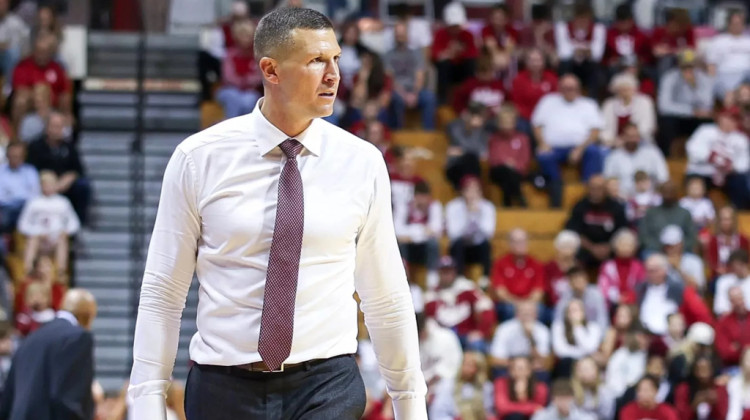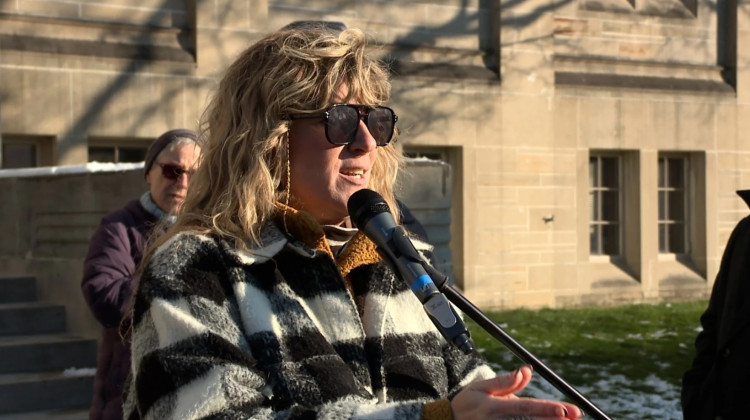
IPS Board member Gayle Cosby speaks during an IPS school board meeting in May.
Scott Elliott / Chalkbeat IndianaINDIANAPOLIS -- Gayle Cosby, often the lone of critic on the Indianapolis Public School Board of the district’s ambitious reform plans, today announced that she will not seek re-election.
The news has some asking if her departure at the end of 2016 will diminish open public discussion of doubts about the district’s fast pace toward a completely overhauled school system.
Cosby has tried the patience of some of her fellow board members, and some hinted the board might be better off without her. But community leaders who share some of Cosby’s concerns about the district’s planned changes — which include giving more freedom to principals, shrinking the central office and partnering more often with charter school networks — say a board without dissenters like Cosby cannot genuinely represent the families IPS serves.
“People are left out,” said Diana Daniels, Executive Director of the Indianapolis-based National Council on Educating Black Children. “There are (people) who are not in favor of charter schools, and their voice also needs to be heard.”
It’s certainly possible the election will produce candidates who are less strongly aligned to the board majority. Voting is months away and it’s not yet clear if the other three pro-reform incumbents facing election this year will run. Board member Sam Odle said he plans to run. Michael O’Connor, appointed to fill an unexpired term, has not yet decided. Diane Arnold also is undecided about her re-election plans.
If the last two elections are any guide, defeating candidates who back the current reform plan will be tough to beat. All of the winning candidates in 2012 and 2014 overwhelmingly outpaced rivals who expressed reservations about the district’s direction, fueled by unprecedentedly huge contributions from pro-reform groups and individuals.
Even Cosby got money from reform-minded organizations when she ran in 2012, calling for a change of direction for IPS. But as a board member, she grew increasingly critical of some policies supported by the rest of the board, particularly partnering with outside organizations to manage persistently failing IPS schools.
Cosby said her decision not to run was linked to starting a doctoral program in urban education. The board is too time consuming for her to commit to another four-year term, she said.
“I feel that my voice, in terms of raising some critical questions, has been very important,” Cosby said. “I’m hopeful that others will emerge in the election cycle for this year that will bring those same qualities to the table.”
But not everyone has appreciated Cosby’s point of view, or her approach to debating her fellow board members.
Board member Kelly Bentley, for one, said Cosby’s role as the primary voice of criticism is oversold. Other board members also ask tough questions, Bentley said, but they do so at school board meetings. Cosby often took to her personal blog to air her complaints.
“I’m not sure that it’s that much of a loss,” Bentley said. “We’re all asking those types of questions; we’re just not blogging about it.”
Board President Mary Ann Sullivan said she also is not worried about the board’s ability to hear all points of view. In fact, she thought changes on the board could improve discussions about the district’s future.
“If the trust level is improved, then perhaps the dialogue can be more robust,” she said.
But one former board member has her doubts.
Without the big political contributions that reform advocates have been getting, former IPS board president Annie Roof said she thinks it’s now impossible for opposition candidates to win school board seats. Roof lost her seat to Sullivan, who raised thousands of dollars more for her campaign in 2014.
“When I ran the first time (in 2010), school board campaigns were funded by sitting around at a kitchen table,” she said.
But today, “money is very powerful,” Roof said.
Roof said she has no interest in running in 2016. The 2014 election was too stressful for her family, she said.
The high-cost of running for an IPS Board seat also worries Chrystal Ratcliffe, president of the Greater Indianapolis NAACP. Low-income citizens, like many families served by IPS schools, can’t raise the money to field a winning campaign, she said.
“Are poverty-stricken people going to have access to that kind of money? Where does that money come from?” Ratcliffe said. “We advocate for our poverty-stricken people, the people who are disenfranchised.”
The NAACP is not necessarily opposed to efforts to make big changes in IPS schools, Ratcliffe said. But she said parents and other community members need more opportunities to learn about the shifts on the horizon and give feedback before decisions are made.
“Those ideas are not getting around to the community the way they should,” she said. “Our communities are left out … of the decision making process as far as being able to give some insight on the experiences they’ve had that could maybe make this work better.”
Chalkbeat Indiana is a nonprofit news site covering educational change in public schools.
 DONATE
DONATE






 Support WFYI. We can't do it without you.
Support WFYI. We can't do it without you.